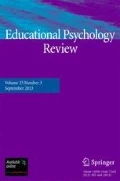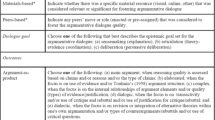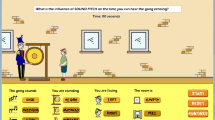Abstract
Research has shown improvements in science, mathematics, and language scores when classroom discussion is employed in school-level science and mathematics classes. Studies have also shown statistically and practically significant gains in children’s reasoning abilities as measured by the Raven’s Standard Progressive Matrices test when employing the practice of “exploratory talk”. While these studies suggest that transfer of learning had taken place, a number of dialog-intensive designs have failed to find positive results, only reported delayed transfer, or have been criticized in terms of methodological rigor, small sample sizes, or because they have only shown small effect sizes. In this study, the claim is made that a particular set of studies which focused on exploratory talk and reasoning abilities, and which used designs that are better positioned to meet the standards mentioned above when presenting data in support of far transfer, provides robust evidence of far transfer within the framework of Barnett and Ceci’s taxonomy of transfer. Possible relationships between exploratory talk, argumentation, and key domains in the science of learning are considered in an attempt to explain the apparent far transfer effects when children engage in exploratory talk.
Similar content being viewed by others
References
Ackerman, P. L., Beier, M. E., & Boyle, M. O. (2005). Working memory and intelligence: the same or different constructs? Psychological Bulletin, 131, 30–60.
Adey, P. (2001). Cognitive acceleration: thinking as intelligence. Teaching Thinking, 5, 38–41.
Adey, P., & Shayer, M. (1994). Really raising standards. London: Routledge.
Bandura, A. (1977). Self-efficacy: toward a unifying theory of behavioral change. Psychological Review, 84, 191–215.
Barnett, S., & Ceci, S. (2002). When and where do we apply what we learn? A taxonomy for far transfer. Psychological Bulletin, 128, 612–637. doi:10.1037//0033-2909.128.4.612.
Boschmans, S.-A. (2013). Teaching pharmacology: issues of language and learning in a multilingual classroom setting. Unpublished PhD. Nelson Mandela Metropolitan University, Port Elizabeth.
Bransford, J. D., Brown, A. L., & Cocking, R. R. (2000). How people learn: brain, mind, experience and school. Washington, DC: National Academies Press.
Bruner, J. (1990). Acts of meaning. London: Harvard University Press.
Chinn, C., & Anderson, R. (1998). The structure of discussions that promote reasoning. Teachers College Record, 100, 315–368.
Cole, M. (2010). What’s culture got to do with it?: Educational research as a necessarily interdisciplinary enterprise. Educational Researcher, 39, 461–470.
Dweck, C. (2006). Mindset: the new psychology of success. New York: Random House.
Ericsson, K. A. (2014). The road to excellence: the acquisition of expert performance in the arts and sciences, sports and games. New York: Psychology Press.
Fortes, M. (1970). Social and psychological aspects of education in taleland. In M. Fortes (Ed.), Time and social structure (pp. 201–239). New York: Humanities Press (Original work published 1938).
Harrison, T. L., Shipstead, Z., Hicks, K. L., Hambrick, D. Z., Redick, T. S., & Engle, R. W. (2013). Working memory training may increase working memory capacity but not fluid intelligence. Psychological Science. doi:10.1177/0956797613492984.
Hewins, N. P. (1914). The doctrine of formal discipline in the light of experimental investigation. Journal of Educational Psychology, 5(3), 168–174. http://dx.doi.org/10.1037/h0070498.
Hodson, D. (2009). Teaching and learning about science: language, theories, methods, history, traditions and values. Rotterdam, The Netherlands: Sense Publishers.
Jaeggi, S., Buschkuehl, M., Jonides, J., & Perrig, W. (2008). Improving fluid intelligence with training on working memory. Proceedings of the National Academy of Sciences of the United States of America, 105(15), 6829–6833.
Jensen, A. (1998). The g factor: the science of mental ability. Westport, CT: Praeger.
Kan, K.-J., Wicherts, J. M., Dolan, C. V., & van der Maas, H. L. J. (2013). On the nature and nurture of intelligence and specific cognitive abilities: the more heritable, the more culture-dependent. Psychological Science, 24(10), 19.
Kane, M. J., Hambrick, D. Z., & Conway, A. R. A. (2005). Working memory and fluid intelligence are strongly related constructs: comment on Ackermain, Beier & Boyle (2005). Psychological Bulletin, 131, 66–71.
Kaplan, R. M., & Saccuzzo, D. P. (1997). Psychological testing: principles, applications and issues. Pacific Grove: Brooks/Cole.
Keefer, M., Zeitz, C., & Resnick, L. (2000). Judging the quality of peer-led student dialogues. Cognition and Instruction, 18(1), 53–81.
Kuhn, D., & Crowell, A. (2011). Dialogic argumentation as a vehicle for developing young adolescents’ thinking. Psychological Science, 22, 545–552.
Kunda, M., McGreggor, K., & Goel, A. (2009). Addressing the Raven’s progressive matrices test of general intelligence. AAAI Fall Symposium on Multi Representational Architectures for Human Level Intelligence, Washington, DC.
Locke, A., Ginsberg, J., & Peers, I. (2002). Development and disadvantage: implications for the early years and beyond. International Journal of Language and Communication Disorders, 37(1), 3–15.
Lynn, R., Allik, J., Pullmann, H., & Laidra, K. (2004). Sex differences on the progressive matrices among adolescents: some data from Estonia. Personality and Individual Differences, 36(6), 1249–1255.
Mercer, N. (1996). The quality of talk in children’s collaborative activity in the classroom. Learning and Instruction, 6(4), 359–377.
Mercer, N., & Littleton, K. (2007). Dialogue and the development of children’s thinking: a sociocultural approach. London: Routledge.
Mercer, N., Wegerif, R., & Dawes, L. (1999). Children’s talk and the development of reasoning in the classroom. British Educational Research Journal, 25(1), 95–111.
Mercer, N., Dawes, L., Wegerif, R., & Sams, C. (2004). Reasoning as a scientist: ways of helping children to use language to learn science. British Educational Research Journal, 30(3), 359–377.
Michaels, S., & O’Connor, M. (2002). Accountable talk: classroom conversation that works. Pittsburg: University of Pittsburgh.
Miller, G. A. (1956). The magic number seven, plus or minus two: some limits on our capacity for processing information. Psychological Review, 62, 81–97.
Miyake, A., Friedman, N. P., Emerson, M. J., Witzki, A. H., & Howerter, A. (2000). The unity and diversity of “frontal lobe” tasks: a latent variable analysis. Cognitive Psychology, 41, 49–100.
Monaghan, F. (2005). ‘Don’t think in your head, think aloud’: ICT and exploratory talk in the primary school mathematics classroom. Research in Mathematics Education, 7(1), 83–100.
Morehouse, R., & Williams, M. (1998). Report on student use of argument skills. Critical and Creative Thinking, 6(1), 14–20.
Moulton, S.T. (2014). Applying psychological science to higher education: key findings and open questions. Retrieved from http://hilt.harvard.edu/hilt-publications on June 18.
Mrazek, M. D., Smallwood, J., Franklin, M. S., Chin, J. M., Baird, B., & Schooler, J. W. (2012). The role of mind-wandering in measurements of general aptitude. Journal of Experimental Psychology: General, 141, 788–798. doi:10.1037/a0027968.
Mrazek, M. D., Franklin, M. S., Phillips, D. T., Baird, B., & Schooler, J. W. (2013). Mindfulness training improves memory capacity and GRE performance while reducing mind wandering. Psychological Science, 24, 776–781. doi:10.1177/0956797612459659.
Nussbaum, E. M., & Asterhan, C. S. (2016). The psychology of far transfer from classroom argumentation. In F. Paglieri (Ed.), The psychology of argument: cognitive approaches to argumentation and persuasion. London: College Publications.
Oberauer, K., Schulze, R., Wilhelm, O., & Suss, H.-M. (2005). Working memory and intelligence—their correlation and relation: comment on Ackerman, Beier, & Boyle (2005). Psychological Bulletin, 131, 61–65.
Osborne, J. (2010). Arguing to learn in science: the role of collaborative, critical discourse. Science, 328(5977), 463–466.
Raven, J., Court, J. & Raven, J. C. (1995). Manual for Raven’s progressive matrices and vocabulary scales. Oxford: Oxford Psychologists Press.
Raven, J., Raven, J. C., & Court, J. H. (2003). Manual for Raven’s standard progressive matrices and vocabulary scales: section 1 general overview. San Antonio, Texas: Pearson.
Redick, T. S., Shipstead, Z., Harrison, T. L., Hicks, K. L., Fried, D. E., Hambrick, D. Z., Kane, M., & Engle, R. W. (2013). No evidence of intelligence improvement after working memory training: a randomized, placebo-controlled study. Journal of Experimental Psychology: General, 142(2), 359–379.
Resnick, L. B. C., Asterhan, C. S. C., & Clarke, S. N. (2015). Introduction: talk, learning, and teaching. In L. B. Resnick, C. S. C. Asterhan, & S. N. Clarke (Eds.), Socializing intelligence through academic talk and dialogue (pp. 1–12). Washington, DC: AERA.
Reznitskaya, A., Kuo, L., Clark, A., Miller, B., Jadallah, M., Anderson, R. C., et al. (2009). Collaborative reasoning: dialogic approach to group discussions. Cambridge Journal of Education, 39(1), 29–48.
Reznitskaya, A., Glina, M., Carolan, B., Michaud, O., Rogers, J., & Sequeira, L. (2012). Examining transfer effects from dialogic discussions to new tasks and contexts. Contemporary Educational Psychology, 37, 288–306.
Richardson, K. (1991). Reasoning with raven in and out of context. British Journal of Educational Psychology, 61 (2), 129–138.
Roediger, H. L. (2013). Applying cognitive psychology to education: translational educational science. Psychological Science in the Public Interest, 14(1), 1–3.
Rogoff, B. (1990). Apprenticeship in thinking: cognitive development in social context. Oxford: Oxford University Press.
Rojas-Drummond, S., & Mercer, N. (2004). Scaffolding the development of effective collaboration and learning. International Journal of Educational Research, 39, 99–111.
Sepeng, P. (2011). Grade nine second-language learners in township schools: issues of language and mathematics when solving word problems. Unpublished PhD. Nelson Mandela Metropolitan University, Port Elizabeth, South Africa.
Shayer, M., & Adey, P. (2002). Learning intelligence: cognitive acceleration across the curriculum from 5 to 15 years. Maidenhead: Open University Press.
Singley, M., & Anderson, J. (1989). The transfer of cognitive skill (Cognitive science series). Cambridge, MA: Harvard University Press.
Szpunar, K. K., Khan, N. Y., & Schacter, D. L. (2013a). Interpolated memory tests reduce mind wandering and improve learning of online lectures. Proceedings of the National Academy of Sciences, 110, 6313–6317.
Szpunar, K. K., Moulton, S. T., & Schacter, D. L. (2013b). Mind wandering and education: from the classroom to online learning. Frontiers in Psychology, 4, 1–7.
Taatgen, N. A. (2013). The nature and transfer of cognitive skills. Psychological Review, 120(3), 439–471.
Toulmin, S. (2003). The uses of argument. New York: Cambridge University Press.
Trickey, S., & Topping, K. (2004). Philosophy for children: a systematic review. Research Papers in Education, 19(3), 365–380.
Villanueva, M. G. (2010). Integrated teaching strategies model for improved scientific literacy in second-language learners. Unpublished PhD. Nelson Mandela Metropolitan University, Port Elizabeth, South Africa.
Vygotsky, L. S. (1981). The genesis of higher mental functions. In J. V Wertsch (Ed.), The Concepts of Activity in Soviet Psychology. New York: Sharpe.
Webb, P. (2003). Initiating classroom discussion in science classrooms: practical work, conversational texts and prompt posters. Unpublished PhD. Curtin University of Technology, Perth, Australia.
Webb, L. (2010a). Searching for common ground: developing mathematical reasoning through dialogue. Unpublished PhD. Nelson Mandela Metropolitan University, Port Elizabeth, South Africa.
Webb, P. (2010b). Science education and literacy: imperatives for the developed and developing world. Science, 328(5977), 448–450.
Webb, P., & Treagust, D. (2006). Using exploratory talk to enhance problem-solving and reasoning skills in grade-7 science classrooms. Research in Science Education, 36(4), 381–401.
Wegerif, R., Mercer, N., & Dawes, L. (1999). From social interaction to individual reasoning: an empirical investigation of a possible socio-cultural model of cognitive development. Learning and Instruction, 9, 493–516.
Wegerif, R., Perez, J., Rojas-Drummond, S., Mercer, N., & Velez, M. (2005). Thinking together in the UK and Mexico: transfer of an educational innovation. Journal of Classroom Interaction, 40(1), 40–48.
Wertsch, J. V. (1991). Voices of the Mind. New York: Harvester.
Wilkinson, I. A. G., Murphy, P. K., & Binici, S. (2015). Dialogue-intensive pedagogies for promoting reading comprehension: what we know, what we need to know. In L. B. Resnick, C. S. C. Asterhan, & S. N. Clarke (Eds.), Socializing intelligence through academic talk and dialogue (pp. 1–12) (pp. 35–48). Washington, DC: AERA.
Acknowledgments
This project was kindly funded in part by incentive funding (UID 85590) from the National Research Foundation (NRF) of South Africa.
Author information
Authors and Affiliations
Corresponding author
Rights and permissions
About this article
Cite this article
Webb, P., Whitlow, J.W. & Venter, D. From Exploratory Talk to Abstract Reasoning: a Case for Far Transfer?. Educ Psychol Rev 29, 565–581 (2017). https://doi.org/10.1007/s10648-016-9369-z
Published:
Issue Date:
DOI: https://doi.org/10.1007/s10648-016-9369-z




